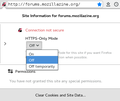
HTTPS-Only Mode
I want to use HTTPS-Only mode, but Firefox enforces it on my private network as well as the public network. Because I do not have certificates for any of my private network hosts HTTPS-Only mode blocks all internal network traffic. The suggested temporary workaround is impractical. Is there a way for Firefox to check the hosts file for a local name/ip or is there another fix for this?
Kiválasztott megoldás
Hi cor-el, running this script in the Browser Console adds exceptions successfully:
/* Add Exceptions to HTTPS-only for listed origins -- only edit next line */ var myOrigins = ['http://example.com', 'http://example.org']; /* Don't edit below this line */ function addException(url){ let uri = Services.io.newURI(url); let principal = Services.scriptSecurityManager.createContentPrincipal(uri, {}); Services.perms.addFromPrincipal(principal, 'https-only-load-insecure', 1, 0); } for (var i=0; i<myOrigins.length; i++) addException(myOrigins[i]);
Perhaps it is possible to adapt that to an Autoconfig script to set up multiple PCs with an array of origins at startup?
Note: To remove the new permissions for those two origins from permissions.sqlite after testing, re-run it with these changes (session only permission):
Services.perms.addFromPrincipal(principal, 'https-only-load-insecure', 9, 1);
Válasz olvasása eredeti szövegkörnyezetben 👍 0Összes válasz (7)
Can you disable HTTPS if you click the padlock button ?
That is one of the impracticable workarounds because it must be done for every URL on each host from every user's and guest's computer. I'm not sure how many unique URLs there are but there are 6 host servers and 7 users and about 12± guests on my home network.
Why don't you disable HTTPS-Only mode if this causes that much problems ?
I'm not using HTTPS-Only Mode because of that. I'd use it if Firefox could determine id a URL was on a local network or on the public network - a trivial determination. IMO it is a major failure on the part of Firefox developers. Otherwise, I like Firefox mostly due to TOR, but have considered moving.
There is a dom.security.https_only_mode.upgrade_local pref that defaults to false.
Kiválasztott megoldás
Hi cor-el, running this script in the Browser Console adds exceptions successfully:
/* Add Exceptions to HTTPS-only for listed origins -- only edit next line */ var myOrigins = ['http://example.com', 'http://example.org']; /* Don't edit below this line */ function addException(url){ let uri = Services.io.newURI(url); let principal = Services.scriptSecurityManager.createContentPrincipal(uri, {}); Services.perms.addFromPrincipal(principal, 'https-only-load-insecure', 1, 0); } for (var i=0; i<myOrigins.length; i++) addException(myOrigins[i]);
Perhaps it is possible to adapt that to an Autoconfig script to set up multiple PCs with an array of origins at startup?
Note: To remove the new permissions for those two origins from permissions.sqlite after testing, re-run it with these changes (session only permission):
Services.perms.addFromPrincipal(principal, 'https-only-load-insecure', 9, 1);
Note that you can also use createContentPrincipalFromOrigin():
var myOrigins = ['http://example.com', 'http://example.org']; function addException(uri){ let principal = Services.scriptSecurityManager.createContentPrincipalFromOrigin(uri); Services.perms.addFromPrincipal(principal, 'https-only-load-insecure', 1, 0); } for (var i=0; i<myOrigins.length; i++) addException(myOrigins[i]);
You can also use this code to remove a permission:
var myOrigins = ['http://example.com', 'http://example.org']; function remException(uri){ let principal = Services.scriptSecurityManager.createContentPrincipalFromOrigin(uri); Services.perms.removeFromPrincipal(principal, 'https-only-load-insecure'); } for (var i=0; i<myOrigins.length; i++) remException(myOrigins[i]);

